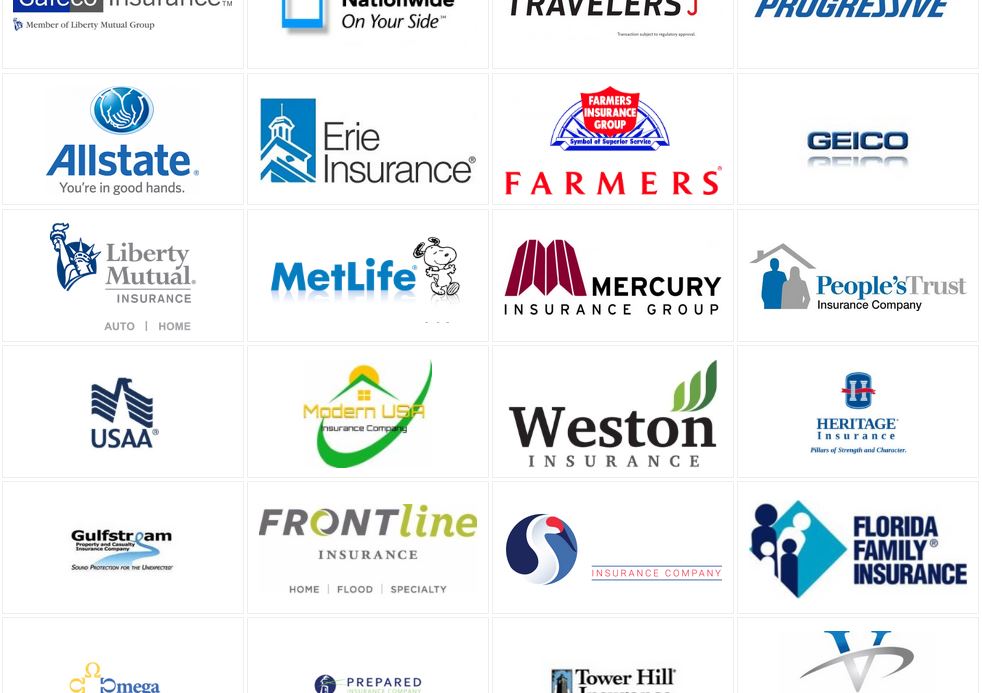
Car insurance in Florida is a necessity, not just a legal requirement. The Sunshine State presents a unique set of challenges for drivers, from high traffic volumes to unpredictable weather. Understanding the intricacies of Florida’s car insurance landscape is crucial for ensuring adequate protection and financial security.
This guide delves into the essential aspects of car insurance in Florida, covering everything from mandatory coverages to factors that influence premiums. We’ll explore how to navigate the insurance market, understand common insurance claims, and discuss additional considerations for Florida drivers.
Understanding Florida’s Car Insurance Landscape
Florida’s car insurance landscape is a unique one, shaped by a combination of factors that significantly influence rates and coverage options. Understanding these factors is crucial for Florida drivers seeking the most appropriate and cost-effective insurance policies.
Factors Influencing Car Insurance Rates
Florida’s car insurance rates are affected by several factors, including:
- High-risk driving environment: Florida has a higher-than-average number of car accidents and uninsured motorists. This contributes to higher insurance premiums as insurers account for the increased risk of claims.
- Frequent natural disasters: Florida is prone to hurricanes, floods, and other natural disasters. These events can cause widespread damage, increasing insurance costs for insurers and, consequently, for drivers.
- High litigation rates: Florida is known for its high rates of lawsuits related to car accidents. This leads to higher insurance costs as insurers need to cover legal expenses and potential payouts.
- No-fault insurance system: Florida operates a no-fault insurance system, which means drivers are required to file claims with their own insurance company regardless of who is at fault. This can result in higher premiums as insurers cover more claims.
- Personal factors: Individual factors such as driving history, age, gender, credit score, and vehicle type also influence car insurance rates.
Mandatory Car Insurance Coverage in Florida
Florida law mandates that all drivers carry certain types of car insurance coverage:
- Personal Injury Protection (PIP): This coverage pays for medical expenses, lost wages, and other related costs for the insured and passengers in their vehicle, regardless of who is at fault. Florida law requires a minimum of $10,000 in PIP coverage.
- Property Damage Liability (PDL): This coverage pays for damages to the other driver’s vehicle or property if the insured driver is at fault in an accident. Florida law requires a minimum of $10,000 in PDL coverage.
Optional Car Insurance Coverage in Florida
In addition to the mandatory coverages, Florida drivers can choose from various optional coverages to enhance their protection:
- Collision coverage: This coverage pays for repairs or replacement of the insured vehicle if it is damaged in an accident, regardless of fault. It is typically not required but can be beneficial for newer or financed vehicles.
- Comprehensive coverage: This coverage pays for repairs or replacement of the insured vehicle if it is damaged due to events other than an accident, such as theft, vandalism, fire, or natural disasters. It is not required but can be valuable for protecting against unexpected losses.
- Uninsured/Underinsured Motorist (UM/UIM) coverage: This coverage protects the insured driver and passengers if they are injured in an accident caused by a driver who is uninsured or underinsured. It is not required but highly recommended in Florida, given the prevalence of uninsured drivers.
- Medical Payments (MedPay): This coverage supplements PIP and pays for medical expenses for the insured and passengers, regardless of fault. It can provide additional protection beyond the minimum PIP coverage.
- Rental Reimbursement: This coverage pays for a rental car while the insured vehicle is being repaired after an accident. It can help minimize inconvenience during the repair process.
- Roadside Assistance: This coverage provides assistance for situations such as flat tires, jump starts, and towing. It can be helpful in emergencies and can be included in some insurance policies or purchased separately.
Factors Affecting Car Insurance Premiums

Car insurance premiums in Florida, like in other states, are influenced by a range of factors that insurance companies use to assess risk and determine the cost of coverage. Understanding these factors can help you make informed decisions about your insurance policy and potentially lower your premiums.
Driving History
Your driving history is a significant factor in determining your car insurance premiums. A clean driving record with no accidents or violations generally results in lower premiums. Conversely, a history of accidents, traffic violations, or even DUI convictions can lead to significantly higher premiums.
- Accidents: Insurance companies consider the frequency and severity of your accidents. Multiple accidents, especially those involving significant damage or injuries, can significantly increase your premiums.
- Traffic Violations: Speeding tickets, reckless driving, and other traffic violations are considered red flags. The more violations you have, the higher your premiums are likely to be.
- DUI Convictions: A DUI conviction is a serious offense that can result in significantly higher premiums or even policy cancellation.
Vehicle Type and Value
The type and value of your vehicle play a crucial role in determining your car insurance premiums. Certain vehicles are considered more expensive to repair or replace, and therefore, insurance companies charge higher premiums for them.
- Vehicle Type: Sports cars, luxury vehicles, and high-performance vehicles often have higher insurance premiums due to their higher repair costs and increased risk of accidents.
- Vehicle Value: The market value of your vehicle is a significant factor. More expensive vehicles typically have higher premiums because the cost of replacement or repair is higher.
Age and Gender, Car insurance in florida
Age and gender are often used as factors in determining car insurance premiums, although their impact can vary depending on the insurance company and state regulations.
- Age: Younger drivers, particularly those under 25, are often considered higher risk due to their lack of experience and higher accident rates. Older drivers, while often having more experience, may be considered higher risk due to potential health concerns.
- Gender: Historically, insurance companies have considered males to be higher risk than females, but this trend has been challenged in recent years. Some states have banned the use of gender as a factor in insurance pricing.
Location and Zip Code
Your location and zip code can significantly impact your car insurance premiums. Insurance companies consider factors like the density of population, crime rates, and the frequency of accidents in specific areas to determine risk.
- Urban Areas: Urban areas with high traffic density and higher crime rates often have higher insurance premiums.
- Rural Areas: Rural areas with lower population density and less traffic may have lower insurance premiums.
Credit Score
In some states, including Florida, insurance companies can use your credit score as a factor in determining your car insurance premiums. The reasoning behind this is that individuals with good credit history are often considered more responsible and reliable, which can translate to lower insurance premiums.
- Good Credit Score: A good credit score can lead to lower car insurance premiums.
- Poor Credit Score: A poor credit score can result in higher premiums.
Navigating the Insurance Market

Navigating the Florida car insurance market can be daunting, but with the right approach, you can find a policy that meets your needs and fits your budget. This section will guide you through the process of choosing the right insurance company, comparing quotes, understanding policy terms, and identifying reputable insurers.
Choosing the Right Car Insurance Company
Selecting the right car insurance company is crucial. It involves considering factors such as financial stability, customer service, coverage options, and pricing.
- Financial Stability: Check the insurer’s financial strength ratings from agencies like AM Best or Standard & Poor’s. These ratings reflect the insurer’s ability to pay claims. Look for companies with strong financial ratings, indicating a lower risk of insolvency.
- Customer Service: Read online reviews, check customer satisfaction ratings, and inquire about the insurer’s complaint resolution process. A company with a good track record of customer service will make dealing with claims smoother.
- Coverage Options: Compare the types of coverage offered by different insurers. Ensure the policy includes the essential coverages you need, such as liability, collision, comprehensive, and personal injury protection (PIP). Consider optional coverages like uninsured/underinsured motorist coverage, roadside assistance, and rental car reimbursement based on your needs.
- Pricing: Obtain quotes from multiple insurers to compare prices. Be aware that premiums can vary significantly based on factors like your driving record, vehicle type, and location. Don’t solely focus on the cheapest option; consider the value you receive for the price.
Comparing Quotes and Finding the Best Deals
Obtaining and comparing quotes is a crucial step in finding the best car insurance deal. Here are some tips to maximize your savings:
- Use Online Comparison Tools: Websites like Policygenius, The Zebra, and Insurance.com allow you to compare quotes from multiple insurers simultaneously. This saves time and effort.
- Contact Insurers Directly: Reach out to insurers directly to obtain personalized quotes. This allows you to discuss your specific needs and ask questions about coverage options.
- Bundle Policies: Consider bundling your car insurance with other policies, such as homeowners or renters insurance. Many insurers offer discounts for bundling multiple policies.
- Shop Around Regularly: Don’t assume your current insurer offers the best rates. Shop around every year or two to see if you can find better deals.
- Ask About Discounts: Inquire about available discounts, such as safe driver, good student, multi-car, and defensive driving discounts. Taking advantage of these discounts can significantly reduce your premiums.
Understanding Policy Terms and Conditions
Reading and understanding your car insurance policy is crucial. It Artikels your coverage, responsibilities, and limitations. Pay close attention to the following:
- Deductibles: This is the amount you pay out-of-pocket before your insurance coverage kicks in. Higher deductibles generally lead to lower premiums, but you’ll have to pay more in the event of a claim.
- Coverage Limits: These limits define the maximum amount your insurance company will pay for specific types of claims. Ensure the limits are sufficient to cover your potential liabilities and expenses.
- Exclusions: Policies typically have exclusions, which are situations where coverage doesn’t apply. Understand the limitations of your coverage and the circumstances that could lead to a claim being denied.
- Renewals: Be aware of the renewal process and any potential changes to your premium. Review your policy before each renewal to ensure it still meets your needs and is priced competitively.
Reputable Car Insurance Companies in Florida
Several reputable car insurance companies operate in Florida. Here are some of the top-rated insurers:
- State Farm: Known for its strong financial stability and wide range of coverage options.
- Geico: Offers competitive rates and a user-friendly online experience.
- Progressive: Provides personalized coverage options and a strong focus on customer service.
- Allstate: Offers a variety of discounts and a strong reputation for claim handling.
- USAA: Exclusively serves military members and their families, known for its excellent customer service and competitive rates.
Understanding Common Insurance Claims

Navigating the intricacies of car insurance claims in Florida can feel daunting, especially if you’ve never had to file one before. This section provides a comprehensive guide to understanding common insurance claims, empowering you to confidently navigate the process.
Filing a Car Insurance Claim in Florida
Filing a car insurance claim in Florida is a straightforward process, but it’s essential to understand the steps involved.
- Contact your insurance company: After an accident or theft, immediately contact your insurance company to report the incident. Be prepared to provide details like the date, time, location, and any injuries involved.
- File a claim: Your insurance company will guide you through the claim filing process, typically requiring you to complete a claim form and provide supporting documentation.
- Cooperate with your insurance company: Provide all requested information and documents promptly, including police reports, medical records, and repair estimates.
- Attend an inspection: Your insurance company may schedule an inspection of your vehicle to assess the damage.
- Negotiate a settlement: Once the damage is assessed, you’ll negotiate a settlement with your insurance company. If you disagree with their offer, you can seek a second opinion or consider mediation.
Types of Car Insurance Claims
Car insurance claims can be categorized into various types, each covering specific events.
- Collision claims: These cover damage to your vehicle resulting from a collision with another vehicle or object.
- Comprehensive claims: These cover damage to your vehicle caused by events other than a collision, such as theft, vandalism, fire, or natural disasters.
- Liability claims: These cover injuries or property damage you cause to others in an accident.
- Personal injury protection (PIP) claims: These cover medical expenses and lost wages for injuries sustained in an accident, regardless of fault.
- Uninsured/underinsured motorist (UM/UIM) claims: These cover injuries or property damage caused by a driver without insurance or insufficient insurance.
Common Claim Scenarios
Car insurance claims are often filed in response to specific scenarios, such as accidents and theft.
Accidents
Accidents are a common reason for filing car insurance claims.
- Rear-end collisions: These are often caused by drivers following too closely or failing to brake in time.
- Side-impact collisions: These can occur at intersections or when drivers fail to yield the right of way.
- Head-on collisions: These are typically the most severe type of accident, often resulting in significant injuries and damage.
Theft
Car theft can be a devastating event, and your insurance policy may cover the loss of your vehicle.
- Grand theft auto: This involves the theft of an entire vehicle.
- Parts theft: This involves the theft of specific parts, such as tires, wheels, or stereo systems.
Tips for Maximizing Claim Payouts
Maximizing your claim payout requires proactive steps and a thorough understanding of your insurance policy.
- Document everything: Take detailed notes of the accident or theft, including the date, time, location, and any injuries involved.
- Gather evidence: Collect any evidence that supports your claim, such as photos, videos, witness statements, and police reports.
- Seek professional repairs: Have your vehicle repaired by a reputable shop that provides a written estimate.
- Negotiate with your insurance company: Be prepared to negotiate with your insurance company to ensure you receive a fair settlement.
- Consult with an attorney: If you’re not satisfied with the settlement offered by your insurance company, consider consulting with an attorney specializing in insurance claims.
Additional Considerations
While understanding the basics of Florida’s car insurance landscape is crucial, there are additional factors to consider that can significantly impact your insurance premiums and coverage.
Florida’s Personal Injury Protection (PIP) Coverage
Florida’s PIP coverage is a mandatory component of car insurance that covers medical expenses, lost wages, and other related costs for injuries sustained in a car accident, regardless of fault. This coverage applies to the insured driver, passengers in their vehicle, and pedestrians struck by the insured vehicle.
Implications of Florida’s No-Fault Insurance System
Florida operates under a no-fault insurance system, which means that drivers are primarily responsible for covering their own medical expenses and lost wages following an accident, regardless of who is at fault. This system aims to streamline the claims process and reduce litigation. However, there are exceptions to this rule, such as when the accident involves a serious injury or death, or when the other driver is uninsured or underinsured.
Tips for Preventing Car Accidents and Maintaining a Safe Driving Record
Maintaining a safe driving record is essential for obtaining affordable car insurance premiums. Here are some tips for preventing car accidents and avoiding traffic violations:
- Avoid Distracted Driving: Put away your phone, avoid eating while driving, and refrain from engaging in other activities that can take your attention away from the road.
- Maintain a Safe Following Distance: This allows you to react to sudden stops or changes in traffic flow.
- Obey Traffic Laws: This includes adhering to speed limits, stop signs, and traffic signals.
- Be Aware of Your Surroundings: Scan the road ahead, check your mirrors regularly, and be aware of pedestrians and cyclists.
- Get Enough Rest: Drowsy driving is as dangerous as driving under the influence of alcohol.
- Avoid Driving Under the Influence: Always designate a sober driver or utilize ride-sharing services.
Last Recap
Navigating the world of car insurance in Florida can seem daunting, but armed with the right information, you can make informed decisions to secure the best coverage for your needs. By understanding the factors that affect premiums, comparing quotes from reputable companies, and being aware of your rights and responsibilities, you can drive confidently in the Sunshine State, knowing you’re protected.
Query Resolution: Car Insurance In Florida
What is the minimum car insurance coverage required in Florida?
Florida requires drivers to carry Personal Injury Protection (PIP) coverage of $10,000, Property Damage Liability (PDL) coverage of $10,000, and Bodily Injury Liability (BIL) coverage of $10,000 per person and $20,000 per accident.
How can I get a discount on my car insurance in Florida?
Many insurance companies offer discounts for safe driving records, good credit scores, bundling multiple insurance policies, and completing defensive driving courses.
What is the difference between PIP and collision coverage?
PIP coverage covers medical expenses and lost wages for you and your passengers in an accident, regardless of fault. Collision coverage pays for repairs to your vehicle if you’re involved in an accident, regardless of who’s at fault.
What should I do if I’m involved in a car accident in Florida?
If you’re involved in an accident, stay calm, check for injuries, exchange information with the other driver(s), call the police, and contact your insurance company.





